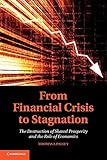From financial crisis to stagnation [Texte imprimé] : the destruction of shared prosperity and the role of economics / Thomas I. Palley, Monographie imprimée
Language: anglais.Country: EtatsUnis.Publication : New York : Cambridge University Press, 2012Description: 1 vol. (xvii-238 p.) ; 24 cmISBN: 978-1-10-701662-0; 1-10-701662-2.Dewey: 330.973, 23Contents note: Goodbye financial crash, hello stagnation The tragedy of bad ideas Overview: three perspectives on the crisis America's exhausted paradigm: macroeconomic causes of the crisis The role of finance Myths and fallacies about the crisis: stories about the domestic economy Myths and fallacies about the crisis: stories about the international economy The coming great stagnation Avoiding the great stagnation: rethinking the paradigm The challenge of corporate globalization Economists and the crisis: the tragedy of bad ideas revisited Markets and the common good: time for a great rebalancing Abstract: "The U.S. economy today is confronted with the prospect of extended stagnation. This book explores why. Thomas I. Palley argues that the Great Recession and destruction of shared prosperity is due to flawed economic policy over the past thirty years. One flaw was the growth model adopted after 1980 that relied on debt and asset price inflation to fuel growth instead of wages. A second flaw was the model of globalization that created an economic gash. Third, financial deregulation and the house price bubble kept the economy going by making ever more credit available. As the economy cannibalized itself by undercutting income distribution and accumulating debt, it needed larger speculative bubbles to grow. That process ended when the housing bubble burst. The earlier post-World War II economic model based on rising middle-class incomes has been dismantled, while the new neoliberal model has imploded. Absent a change of policy paradigm, the logical next step is stagnation. The political challenge we face now is how to achieve paradigm change"--Provided by publisher.Bibliography: Bibliogr.. Index.Subject - Topical Name: Récessions États-Unis | Crises financières États-Unis | Crise économique (2008) | États-Unis, Politique économique Subject - Geographical Name: États-Unis, Conditions économiques, 2001-| Item type | Home library | Collection | Call number | Status | Date due | Barcode | Item holds |
|---|---|---|---|---|---|---|---|
| Prêt normal | BU Chevreul 2ème étage : Economie | Economie et gestion | 332.044 PAL (Browse shelf (Opens below)) | Available | 0379085824 |
Bibliogr.. Index
Goodbye financial crash, hello stagnation The tragedy of bad ideas Overview: three perspectives on the crisis America's exhausted paradigm: macroeconomic causes of the crisis The role of finance Myths and fallacies about the crisis: stories about the domestic economy Myths and fallacies about the crisis: stories about the international economy The coming great stagnation Avoiding the great stagnation: rethinking the paradigm The challenge of corporate globalization Economists and the crisis: the tragedy of bad ideas revisited Markets and the common good: time for a great rebalancing
"The U.S. economy today is confronted with the prospect of extended stagnation. This book explores why. Thomas I. Palley argues that the Great Recession and destruction of shared prosperity is due to flawed economic policy over the past thirty years. One flaw was the growth model adopted after 1980 that relied on debt and asset price inflation to fuel growth instead of wages. A second flaw was the model of globalization that created an economic gash. Third, financial deregulation and the house price bubble kept the economy going by making ever more credit available. As the economy cannibalized itself by undercutting income distribution and accumulating debt, it needed larger speculative bubbles to grow. That process ended when the housing bubble burst. The earlier post-World War II economic model based on rising middle-class incomes has been dismantled, while the new neoliberal model has imploded. Absent a change of policy paradigm, the logical next step is stagnation. The political challenge we face now is how to achieve paradigm change"--Provided by publisher


